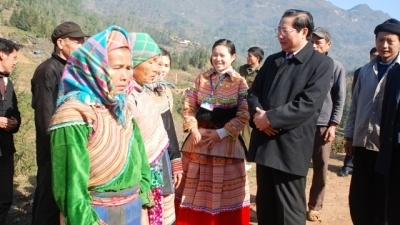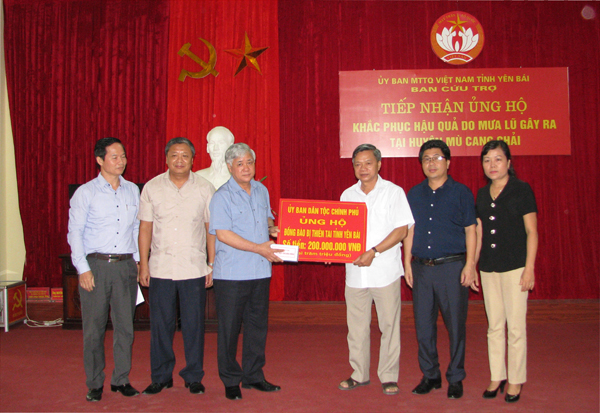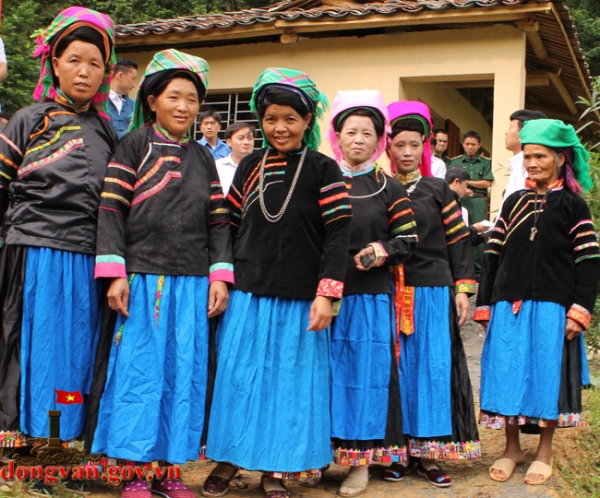Ethnic strategy to 2020 focuses on socio-economic development in ethnic minority groups
09:24 AM 13/06/2016 Views: 1060 PrintWith close monitoring of the Government, active involvement of the Government Committee for Ethnic Minority Affairs (CEMA), ministries and localities, ethnic minority people' living standards have been improved. Minister and CEMA Chairman Giang Seo Phu granted Nhan Dan (People) newspaper an interview as follows. Question (Q): The Party and State always define work with ethnic minority communities as an important part in the country’s socio-economic development strategy, creating momentus for improving the living standards for over 12 million citizens of ethnic minority. Could you brief us on the outcomes of ethnic minority work in 2014 and the initial results in realising the Strategy on Ethnic Minority Work to 2020?
Answer (A): In 2014, the CEMA rigorously monitored the implementation of directions by the Government and the Prime Minister, improved the committee’s leadership approaches in implementing key tasks, as well as worked closely with ministries, central agencies and localities to effectively realise policies related to ethinic minority groups. As a result, ethnic minority communities and mountainous regions saw continued stability, improved socio-economic conditions and an improved cultural and spiritual life. The poverty rate in ethnic minority groups and mountainous regions was reduced between two and four percent; in particular, a reduction over four percent was reached in the most disadvantaged districts. National defence and political security and the great unity bloc in the regions were strengthened and ethnic minority groups gained confidence in the leadership of the Party and State.
CEMA institutionalised the Government’s resolutions and the PM’s directions related to ethnic minorities, consulting the PM on issuing Directive No.28/CT-TTg dated September 10, 2014 on enhancing efficiency and effectiveness of State management over work with ethnic minority groups. It also closely monitored the construction of schemes and policies as assigned by the Government and the PM.
In addition, the committee submitted a list of 2,331 extremely disadvantaged communes to the PM in order to help them access investment from the Government’s 2014-2015 programme on socio-economic development in extremely disadvantaged communes in ethnic minority groups and mountainous regions.
CEMA steered localities to successfully organise conferences for ethnic monirity groups at provincial and district levels, in order to prepare for Party congress at all levels and the 12th Party Congress.
A delegation of representatives from 54 ethnic minority groups had a working visit to Truong Sa Island district and the DK1 Guard House to consolidate the national great unity bloc in protecting the country’s sovereignty over Hoang Sa (Paracel) and Truong Sa (Spratly) archipelagos.
CEMA effectively managed the allocated State budget of VND4.5 trillion (US$210 million) for 2014 and continued working on a budget plan for the 2016-2020 period.
The committee held conferences on reviewing the implementation of the Government’s resolution on ethnic minority work and pushing ministries and localities to continue the implementation effectively.
It also launched a statistics system on ethnic minority work to lay a legal basis for collecting data about ethnic minority work and developing plans, policies and strategies for the development of ethnic groups in Vietnam.
CEMA enhanced administrative reforms, examination and anti-corruption work, communication and education on legal regulations for ethnic minority groups while boosting scientific studies, and international co-operation.
The implementation of the Stategy on Ethnic Minority Work to 2020 is significant and practical for socio-economic development in ethnic minority groups and mountainous regions. Ministries and localities should better implement the Government’s resolution on ethnic minority work and work closely with CEMA to review, amend, and supplement policies related to ethnic minority work and devise new programmes and policies for the 2016-2020 period.
Outcomes in implementing policies related to ethnic minority work have contributed to realising the National Target Programmes on Poverty Reduction and Construction of New-style Rural Areas. In 2014, the average growth rate of ethnic minority groups and mountainous provinces was 8-10% and several localities were estimated to have reached growth rates over 10%.
Q: How do you evaluate the action programme on international integration during the 2014 - 2020 period and the mobilisation of resources in an effort to eradicate hunger and reduce poverty in ethnic minority groups and mountainous areas?
A: CEMA has adjusted and supplemented co-operative agreements with Thailand, Myanmar, and Laos as well as promoted its relationship with other countries and international organisations (Ireland, EU, UNDP, World Bank, South Africa, Bangladesh, and others).
CEMA has also directed the implementation of a master plan on strengthening international co-operation to support socio-economic development in ethnic minorities and mountainous areas during the 2014-2020 period, in accordance with the Prime Minister's Decision No.2214/QD-TTg on November 14, 2013; and enacted other policies related to ensuring human rights for ethnic minority people.
The Committee also directed the organisation of a conference on the promotion of regional investment, issued an action plan on international integration during the 2014-2020 period; and built the strategy on international integration and ethnic minorities affairs to 2020, with a vision to 2030.
Q: Can you tell us about some key tasks of CEMA in 2015?
A: Although the work with ethnic minority groups has seen significant achievements in recent years, many ethnic minority groups and mountainous areas are still facing numerous difficulties and challenges. The regional economy remains underdeveloped, especially in terms of productivity, manufacturing quality and efficiency, not yet commensurate with the potential and strengths of the region. The living conditions of ethnic minority groups have been improved significantly, but the poverty rate is still high compared to other regions in the country.
In 2015, CEMA must review and evaluate the degree of fulfillment of the objectives of each policy on ethnic minority work; propose the construction of related projects and policies to be implemented in the 2016-2020 period and subsequent years; and prepare necessary conditions to soon establish the Institute for Nationalities which has recently got the green light from the Government.
In 2015, CEMA will also submit to the Politburo and the Party Central Committee (PCC) the revision of the 10 year implementation of PCC's Resolution No.24 on ethnic minority work, and build a master plan on comprehensively developing Vietnamese ethnic groups under the leadership of the Party for the 2016-2020 period.
The committee will also give priority to administrative reform and co-ordinate with relevant ministries and agencies to increase the quality and efficiency of building legal documents and policies in the State management of ethnic minority affairs, thus ensuring the legitimate rights and benefits of ethnic minority groups; protecting and promoting the diversity of ethnic minority cultures and languages, and supporting access to better education and health care services.
Q: Ahead of the New Year, what is your message to ethnic minority people from across the country?
A: Thanks to the special attention of the Party and State, the close co-ordination among ministries and sectors and the joint effort of ethnic minority people from across the country, I believe that more and more policies, action programmes and projects will be implemented in an effective and practical manner to help boost socio-economic development amongst ethnic minorities groups and in mountainous areas, contributing to reducing the poverty rate and decreasing the gap between regions. On the occasion of the new spring, on behalf the CEME, I wish all a happy new year.
Thank you very much!
(en.nhandan.com.vn)
54 ETHNIC GROUPS
THỐNG KÊ TRUY CẬP
Số lượt truy cập hiện tại: 22
Tổng số truy cập:




